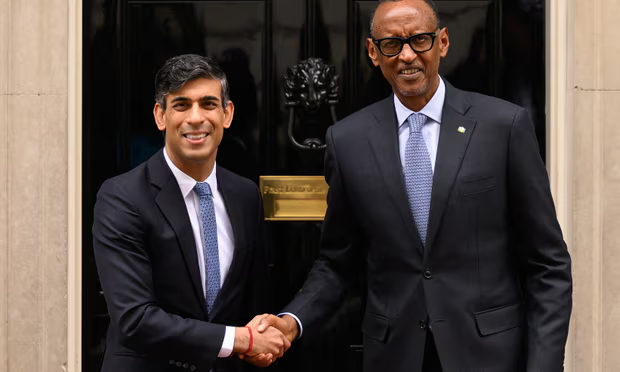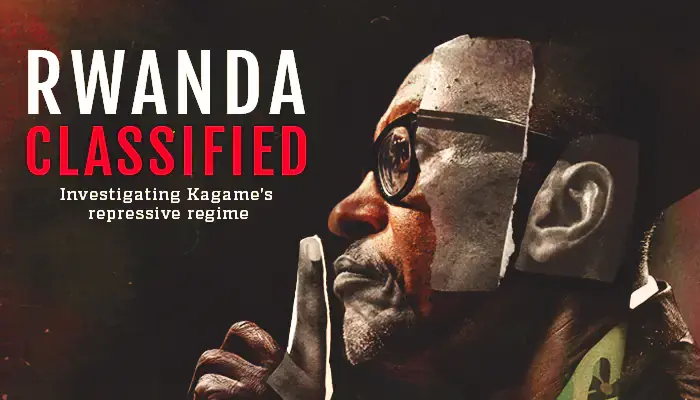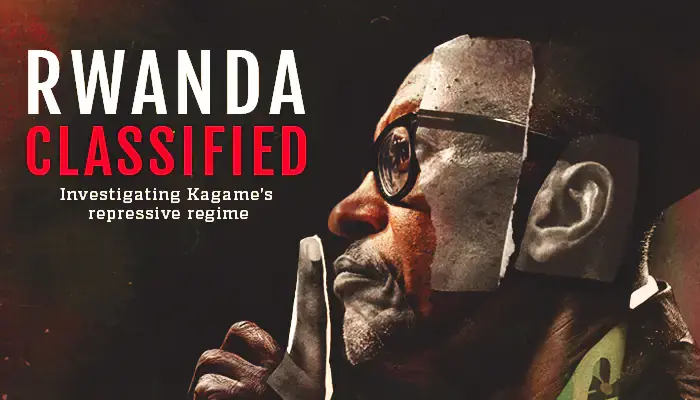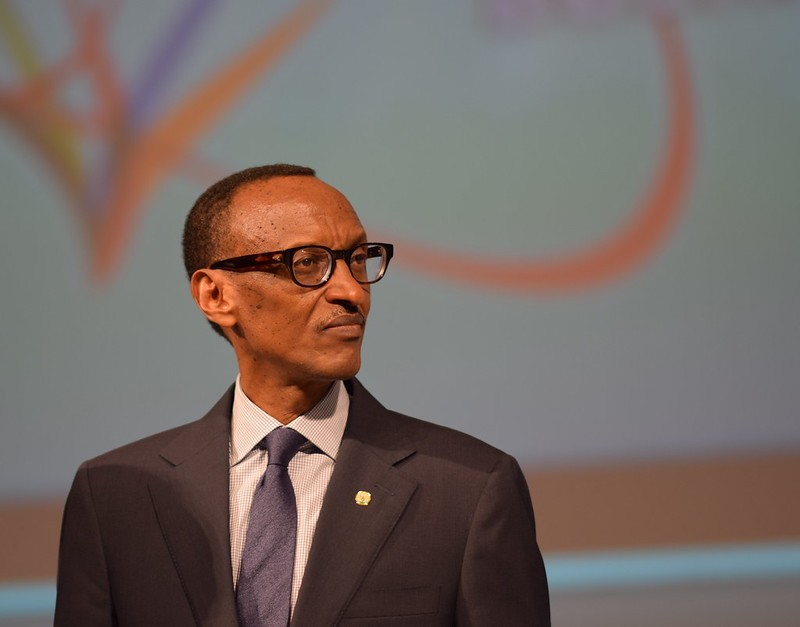Key findings
- Public records reveal how Rwanda hired at least a dozen PR firms and lobbyists in the US and UK, in a sustained effort to manage the regime’s image in the West
- A pro-Rwandan government campaign on social media suggests the involvement of Team Jorge, an Israeli psy-ops mercenary previously unveiled by Forbidden Stories in May 2023
- Rwandan critics in Western Europe have been intimidated and trolled online
In February 2024, several thousand businesspeople, NGO leaders and expats met at a glitzy waterfront resort in Maryland’s National Harbor, just across the border from DC, to celebrate Rwanda Day.
The event, somewhere between a red-carpet gala and a job fair, treated attendees to photo portraits before a green and blue backdrop, colorful dance performances, and a “career corner” for job opportunities. In a stately conference hall—the Maryland Ballroom—private sector companies, including Norrsken Africa, Trinity Metals, and Entrepreneurial Solutions Partners, and non-profit leaders in sports and medicine praised Rwanda’s business environment and social progress.
The main event was the next evening. Hundreds of people waited for hours to enter the Maryland Ballroom, where Rwandan President Paul Kagame spoke to an adoring crowd. Kagame’s drawling speech, punctuated by long pauses, allowed him to highlight Rwanda’s progress. “Rwandans have repaired what was destroyed, including our lives, and we are much better now than we were 30 years ago,” he said. “We just have to keep going.”
The speech capped the event and left attendees with a picture-perfect image of the ‘New Rwanda’ that emerged in the wake of the 1994 genocide, during which roughly 800,000 civilians, mostly from the Tutsi minority, were slaughtered. In Kagame’s 24 years in power, Rwanda has projected its positive image abroad: in glowing international press coverage, we learn of Kigali’s plastic-free streets, its majority-women parliament, and its willingness to take in refugees.
Alexander Dukalskis
ASSOCIATE PROFESSOR IN THE SCHOOL OF POLITICS AND INTERNATIONAL RELATIONS AT UNIVERSITY COLLEGE DUBLIN
“You see a small country – relatively low resource – allegedly go after dissidents and critics abroad with a level of focus and logistical coordination that is pretty remarkable”
Upon leaving the event, an attendee might be compelled to visit the home page of the Visit Rwanda site, where the country advertises its appeal. At the top of the page a sleek video shows lush, tropical forests; modern cities; smiling women in business suits – beckoning visitors to the “land of a thousand hills.” Run by the Rwanda Development Board (RDB), a governmental agency in charge of increasing investment in the country and whose CEO spoke at Rwanda Day, the site is part of a global marketing campaign. “Visit Rwanda” is stamped on football jerseys in Europe and appears courtside on banners at games of the NBA-funded Basketball Africa League. The RDB collaborated in organizing a concert series featuring Kendrick Lamar as well as the Tour du Rwanda cycling race.
Rwanda Day 2024 attendees gathered in the Maryland Ballroom. Photo: Amrai Coen/Die Zeit
Beneath the veneer of progress, however, is the hidden arm of a puppeteer. While Rwanda rolls out the red carpet for celebrities and corporations, those who critique the regime are subject to trolling campaigns, spyware attacks, and even physical intimidation. The operation to conceal abuses and silence critics is abetted by a wide range of PR firms, influencers, and agents – with networks reaching as far as Europe and North America. As part of the Rwanda Classified project, Forbidden Stories worked with 50 journalists from 17 media organizations in 11 countries to reveal the discreet actors behind Rwanda’s influence machine, including more than a dozen US PR firms and lobbyists, employees of a UK company and possibly an Israeli psyops group.
“You see a small country – relatively low resource – allegedly go after dissidents and critics abroad with a level of focus and logistical coordination that is pretty remarkable,” Alexander Dukalskis, associate professor in the School of Politics and International Relations at University College Dublin, who wrote a book about authoritarian regimes, said.
Michela Wrong
INVESTIGATIVE JOURNALIST, AUTHOR OF “DO NOT DISTURB”
“It's organized, it's systematic, and it comes from the regime itself”
Investigative journalist Michela Wrong, who consulted with Forbidden Stories on this project, is the author of “Do Not Disturb,” a critical exposé of Kagame’s Rwandan Patriotic Front (RPF) party. Wrong has since become accustomed to attacks from anonymous trolls whenever she tweets or gives talks about Rwanda. “There’s constant harassment coming from Kigali, and it’s not innocent, it’s not ordinary citizens,” Wrong said in an interview with Forbidden Stories’ partner RTBF. “It’s organized, it’s systematic, and it comes from the regime itself.”
Attempts to deplatform Wrong through trolling took place in London and South Africa, where she was slated to give talks in person and online, respectively. In several instances, these online attacks have spilt into the real world. In Brussels, a political debate for which Wrong was scheduled to participate had to be relocated after the original venue received phone calls, text messages, and even in-person visits asking them to suspend it. Most recently, in May 2024, Wrong traveled to her book launch in New Zealand, where she was again inundated with tweets accusing her of racism and bias using the hashtag #RacismIsWrong.
“This is a worldwide phenomenon,” Wrong said. “That they pursued me as far as there, I was absolutely gobsmacked.”
British investigative journalist Michela Wrong. Photo: Michela Wrong/Twitter
Rwanda, Wrong learned, was not acting alone. After being leaked an intelligence dossier, she learned that the online campaign against her could be traced to Chelgate, a UK-based PR firm known for its reputation management services. A team of Chelgate employees participated in harassing Wrong on social media, at least one Amazon book review and a Change.org petition, in 2021 and 2022, she and other journalists reported.
In an email, Chelgate Executive Chairman Terence Fane-Saunders wrote that while Chelgate is unable to comment on its activity for clients, he could “categorically state that we have never set up any social media site – anonymous or otherwise – with the purpose of defaming Michela Wrong or any other individual.”
He added that Chelgate had not engaged in any activities on behalf of Rwanda in the past two calendar years.
Following up, Forbidden Stories found that Chelgate employees in some cases seemed to reap rewards for the firm’s alleged tactics.” In 2021, Rwanda invited five employees of the firm to the COP26 climate conference in Glasgow. Today, a former Chelgate employee – Harry James Burns – responds to an email address from Rwanda’s Office of the Government. (“Any relationship that may exist between Harry Burns and the Government of Rwanda is a matter for Mr Burns or that government to confirm or deny,” Fane-Saunders said.)
Apart from Chelgate, a small army of PR and marketing firms work with Rwanda to promote its global image, according to FARA filings, which US companies must submit to lobby on behalf of foreign governments. These publicly-available documents reveal a sustained effort to manage the regime’s image in the West.
One lobbyist, Michelle Martin, was hired to “map transnational networks” of Rwandan exiles and “present findings and analysis at conferences on a global basis,” according to her filing. Rwanda later called her to the witness stand in their case against Paul Rusesabagina, the former manager of the Hôtel des Mille Collines, who saved the lives of roughly 1,200 Tutsis during the genocide. In court, Martin presented emails from Rusesabagina’s foundation that were used to build a case against him. Another agency, W2 Group Inc, was paid $50,000 per month to “negate” misperceptions about Rwanda as a “failed state,” promoted by NGOs like Human Rights Watch, which has criticized the country’s transnational repression.
Forbidden Stories was unable to reach Martin, who is currently on medical leave. An email for W2 Group was returned to sender. However, Larry Weber, CEO of W2 Group, has previously told Human Rights Watch that “his firm was not instructed to counter specific critiques, but rather given a broader mandate to increase positive news coverage of Rwanda to counter negative press and diaspora critiques.”
Grady Vaughan
RESEARCH ASSOCIATE AT THE NGO FREEDOM HOUSE
“You have a lot of people who have fled the country because of persecution or other disagreements with the government.”
“Rwanda wants to maintain its image as a developmental powerhouse,” Grady Vaughan, a research associate at the NGO Freedom House, explained. “It’s hard to do that when you have a lot of people who have fled the country because of persecution or other disagreements with the government.”
In 2023, perceived opponents of the Rwandan government found themselves tagged in tweets attacking them. Targets included the leader of the exiled FDU Inkingi party Placide Kayumba; two European experts on Rwanda; and members of Jambo News, a Belgium-based media run by Rwandan exiles. Many of those tagged, including Kayumba; Charles Onana, an author who has written about Rwanda; and Jambo News, have been accused of genocide denial. (Legal complaints for négationnisme have been filed against Onana in France.) This was weaponized by the trolls, who questioned the exile’s motivations.
In May, a small number of X (formerly Twitter) users began posting the hashtag #StopTutsiGenocideDenial. “Let us never forget that organizations like @jamboasbl led by people as [Natacha Abingeneye, a Jambo ASBL affiliate] and [Placide Kayumba] are still denying the horrors occurred in #Rwanda back in 1994,” the account Adam Kovacs, whose profile pictured a shirtless, bearded man with rectangular sunglasses and a location in Dortmund, Germany, wrote, adding: “How can you look in your kids eyes?!?!?!!?’”
“The #Rwanda #Genocide should never be forgotten. Over 500k dead and no country intervened. Ask yourself why? The answer is nobody cared,” a premium account going by the name of John Babikian wrote. Two news outlets – European Business Review and Vents Magazine – published stories highlighting the hashtag campaign, citing among other experts “Harvard educated attorney of Tutsi descent” John Babikian.
Screenshots of the #StopTutsiGenocideDenial hashtag.
While the campaign may have seemed organic, analyzing the posts, Forbidden Stories and its partners found otherwise. The digital assets used to construct the campaign, including the pay-to-publish sites and bot accounts like Kovacs, overlap with the work of Team Jorge, an Israeli psy-ops group known for meddling in foreign elections.
Forbidden Stories unveiled the existence of Jorge, the pseudonym of former Israeli intelligence officer Tal Hanan, in 2023 as part of the Story Killers project, a global investigation into disinformation mercenaries, but the link between Rwanda and Team Jorge was not previously suspected.
Numerous similarities between the Rwanda campaign and the past work of Team Jorge suggests their possible involvement.
European Business Review and Vents Magazine – pay-to-publish sites featuring content written by ghostwriters and content marketers – both previously appeared in campaigns by Team Jorge. So too did the blog site, bloggersdelight.dk, which in May 2023 hosted a post highlighting the #StopTutsiGenocideDenial hashtag campaign. The account posting under the name of John Babikian, the promoter of a stock scalping scheme whose bank accounts were frozen by the US SEC in 2014, appears to be connected to the Team Jorge network. The website in Babikian’s Twitter bio had also previously been used for a 2022 campaign by Team Jorge.
While we were unable to identify bots previously used by Team Jorge in the Rwandan campaign, several accounts shared characteristics with known Team Jorge accounts, including tweeting patterns and last names.
Tal Hanan did not respond to multiple emails and texts requesting comment.
Rwanda’s close-knit partnership with Israel goes back to at least 2016, when Israeli Prime Minister Benjamin Netanyahu visited Kigali. This visit tracks with the beginning of Rwanda’s use of Israeli surveillance equipment to track opponents and critics, as Forbidden Stories and partners revealed in the 2021 Pegasus Project.
Some European countries have also developed close business ties with Rwanda. Germany pledged 180 million in development aid from 2020 to 2024. Rwanda has, for its part, partnered with German businesses, including the football club FC Bayern Munich, where the Rwanda Development Board is a “platinum partner” until 2028.
An ad for FC Bayern’s premium partnership with Visit Rwanda. Credit: Visit Rwanda
As part of this project, Forbidden Stories’ partners at Paper Trail Media identified a Rwandan woman, Chantal M., who claims to have organized the sponsorship deal between the RDB and FC Bayern Munich. Her trail led us to Bavaria, where M. lives. Research showed that she was the girlfriend of well-known German sports manager Stefan Schaffelhuber, at least for several years until 2019. The two were or are also business partners. According to the latest publicly available register extracts, M. owns 20 percent of the shares of Schaffelhuber’s consulting company.
A spokesperson from FC Bayern Munich did not respond to specific questions about the sponsorship deal or Chantal M.’s alleged involvement. “FC Bayern has concluded a contract, which is common in European soccer, with a tourism authority for perimeter advertising in its own stadium, in this specific case with the Rwanda Development Board, which is responsible for tourism,” the spokesperson said, adding that the organization “trusts the fundamental assessments of the European Union on Rwanda.”
France, too, has sought closer ties to Rwanda. In 2018, then-President Nicolas Sarkozy met with the then-CEO of the Rwanda Development Board in Kigali. That same year, he was seen with President Kagame at the World Cup in Russia. In 2021, it was reported that he played a role in rapprochement between Kigali and Paris under President Emmanuel Macron.
But for those who critique the country, such as Carlos Martens Bilongo, La France Insoumise deputy and president of the France-Democratic Republic of Congo Friendship group, the situation is different. Bilongo told Forbidden Stories’ partner Radio France that he had been warned on several occasions about being too vocal on Rwanda’s human rights record, including by ambassadors. “Often they’ll say, ‘a Rwandan friend of mine said that they don’t appreciate your positions,’ or ‘right now they’re talking about you,’” he said. “It’s often little threats like that.”
Neither the Rwandan government, nor the Rwanda Development Board responded to questions regarding the country’s human rights record.
For Wrong, the author of “Do Not Disturb,” the psychological impacts of her targeting have left a scar. Wrong often wakes up screaming after nightmares of Rwandan agents entering her home. She worries about friends and family traveling in Rwanda.
“It creates a constant feeling of dread,” Wrong said of the trolling. “The aim is to make you paranoid and therefore to make you go silent.











